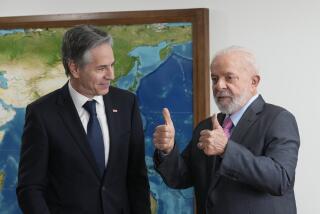New Government Must Face Rising Inflation, Falling Exports : Economic Time Bomb Ticking in Brazil
- Share via
RIO de JANEIRO — Brazil’s authoritarian regime, now in its final days, is allowing inflationary pressures to grow and exports to decline in violation of commitments to the International Monetary Fund and foreign banks that are owed more than $100 billion.
This situation, which has been worsening since last December, promises to leave a financial time bomb for President-elect Tancredo Neves. Neves, who was elected in January, is scheduled to take office Friday, ending 21 years of rule by army generals.
Negotiations with the IMF on continuing a 2-year-old stabilization program to halt deficit spending and reduce inflation were suspended last month. Jacques de Larosiere, the IMF managing director, refused to submit to his executive board a proposal from Brazil for putting its finances in order.
As a result, negotiations on refinancing $45 billion in debt to international banks--falling due between now and 1991--were also suspended and will be resumed by the incoming government.
Neves has not yet formally announced his Cabinet, but it is widely understood that his minister of finance and key economic adviser will be Francisco Dornelles, who is now director of the federal tax system. He is also a nephew of Neves and is regarded as a practical career civil servant.
In the absence of a designated Cabinet, no policy has been defined. Neves has talked about reducing inflation as a top priority, but some of his advisers have discussed stimulating an economic recovery and relieving hardships on businessmen and workers caused by wage restraints and credit shortages.
Circumstances may force the new government to begin by imposing even more austerity to cope with the financial disorder that has developed in the last months of the outgoing regime.
The uncertainty has been reflected in a sharp rise in the dollar on the exchange markets. The black market value of the dollar rose to a record 5,300 cruzeiros last week. The official rate is 4,020.
On the external front, Brazil proposed to the IMF that it could achieve a commercial surplus this year of $12.9 billion. That would match last year’s surplus, which permitted Brazil to meet $11 billion in interest on its foreign debt and accumulate some reserves as well. But the export target for this year is $28 billion, compared to the $27 billion reached last year.
The export drive is off to a bad start. Bank of Brazil’s external trade department disclosed last Thursday that exports for the first two months of this year were down by $350 million, 19% less than last year’s level for the same period.
The strengthening of the dollar is making Brazil’s exports less competitive, since the cruzeiro is linked to the dollar. It costs European and Asian customers more to buy Brazil’s exports and, in the U.S. market, Brazil faces competition from non-dollar exports.
The remedy would be a devaluation of the cruzeiro, to restore a competitive edge. But this would cause more internal inflation, since it would raise the cost of imported goods, such as wheat and petroleum. The present government has taken no action on the problem.
Without an improved export performance, Brazil will not be able to cover the foreign debt interest from commercial surpluses this year. Rising foreign interest rates now make it likely that Brazil will have to pay more on its debt than it did last year.
Internally, Brazil has virtually abandoned the terms of its stabilization agreement with the IMF. Monetary expansion, which got out of control last year, contributed to a record 227% increase in prices.
The central bank’s monthly report for February showed that the paper money flood continues. For the first two months, the emission of paper money increased by 19.7%. Inflation for the first two months of the year reached 23%.
The government has had to make emergency injections of billions of cruzeiros to cover the collapse of Banco Sur Brasileiro, the biggest bank in the state of Rio Grande do Sul, and cover deficits in the social security system.
In other vital areas, the government is not meeting obligations to avoid further monetary expansion. Cotton farmers now harvesting their crops have been unable to get the minimum price guaranteed by the government because the cotton purchasing agency lacks money. Financing for farmers preparing to sow corn, soybean and other major crops has been cut by 75%.
Other huge government obligations, which will fall to the new government, are now being disclosed. The special government agency to promote Brazil’s maritime fleet is stuck with $500 million in loan guarantees to shipyards, which are paralyzed because of canceled orders.
More to Read
Sign up for Essential California
The most important California stories and recommendations in your inbox every morning.
You may occasionally receive promotional content from the Los Angeles Times.













